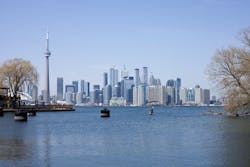Indigenous Reserve in Canada Living Without Running Water
Iokarenhtha Thomas lives in the Six Nations of the Grand River indigenous reserve in Ontario, Canada. For almost a year, she went to the doctor to get lotions for her six-year-old son Theron who had a mysterious rash. The rash always returned, and Thomas came to suspect the culprit was water, or the lack of it.
According to The Guardian, Thomas has lived without running water since she was 16. Her five children lack access to commonplace items such as toilets and showers. They must use a bucket as a toilet and one to wash themselves in.
The Native community is located in southern Ontario, 90 minutes from Toronto. Canada is regularly ranked as one of the United Nations’ top places in the world to live.
Thomas and her husband have to grab jugs and pails to drive 8 km to a public tap to fill up twice per week. However, this water is not drinkable. Once a week they drive 10 km to Caledonia to buy bottled water.
“When my husband isn’t here, it makes it difficult to do the dishes or anything because I don’t have the strength to carry all the jugs of water,” Thomas said. “When I start to compare my life to someone who isn’t living on reserve, I start feeling angry at the government. Because our people don’t have running water. But that’s just the reality of living on reserve. You grow up being treated unfairly.”
Each container of bottled water weighs more than 40 lb, so Thomas began supplementing them with rainwater collected from her rooftop gutters. She would have continued this if it had not been for her son’s rash, which was later diagnosed as impetigo. Thomas believes it came from bacteria on the roof shingles.
“It made me feel like a bad mother to know that he had all these skin issues from washing with [rain] water,” she said.
Michael Montour, director of public works for Six Nations, says 99% of the homes in the community are not connected to the water treatment plant. Some homes, like the Thomas home, have no water at all. Other have water in their taps, but it is too polluted to drink.
The Six Nations are not the only First National community in Canada with a water crisis. 50 indigenous communities have long-term boil water advisories, meaning an estimated 63,000 people haven’t had drinkable water for at least a year. The lack of water has been linked to health issues in indigenous communities including hepatitis A, gastroenteritis, giardia lamblia (“beaver fever”), scabies, ringworm and acne.
